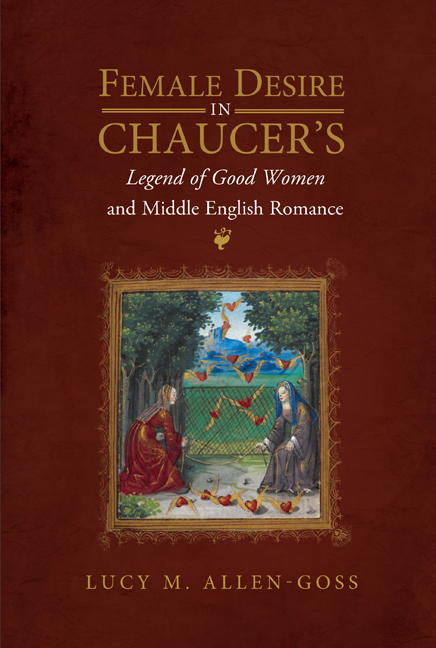Book contents
- Frontmatter
- Contents
- Acknowledgements
- Abbreviations
- Author’s Note
- Introduction: The Origins of Female Desire
- 1 The Silencing of Female Desire in the ‘Legend of Philomela’
- 2 The Traumatised Narrative of the Alliterative Morte Arthure
- 3 ‘As Matter Appetiteth Form’: Desire and Reciprocation in the ‘Legend of Hipsiphyle and Medea’
- 4 Stony Femininity and the Limits of Desire in The Sowdone of Babylon
- 5 Veiled Interpretations and Architectures of Desire in the ‘Legend of Thisbe’ and the ‘Legend of Ariadne’
- 6 Opening Mechanisms, Enclosing Desire: The Erotic Aesthetics of Undo Your Door
- Conclusion: The Ends of Desire
- Bibliography
- Index
- GENDER IN THE MIDDLE AGES
3 - ‘As Matter Appetiteth Form’: Desire and Reciprocation in the ‘Legend of Hipsiphyle and Medea’
Published online by Cambridge University Press: 16 September 2020
- Frontmatter
- Contents
- Acknowledgements
- Abbreviations
- Author’s Note
- Introduction: The Origins of Female Desire
- 1 The Silencing of Female Desire in the ‘Legend of Philomela’
- 2 The Traumatised Narrative of the Alliterative Morte Arthure
- 3 ‘As Matter Appetiteth Form’: Desire and Reciprocation in the ‘Legend of Hipsiphyle and Medea’
- 4 Stony Femininity and the Limits of Desire in The Sowdone of Babylon
- 5 Veiled Interpretations and Architectures of Desire in the ‘Legend of Thisbe’ and the ‘Legend of Ariadne’
- 6 Opening Mechanisms, Enclosing Desire: The Erotic Aesthetics of Undo Your Door
- Conclusion: The Ends of Desire
- Bibliography
- Index
- GENDER IN THE MIDDLE AGES
Summary
The ‘Legend of Hipsiphyle and Medea’ continues Chaucer's exploration of the deformations of language that arise from the attempt to articulate female desire. The tale forms part of a sequence of stories about relictae, women abandoned in love, whose paradigmatic example is the Carthaginian queen Dido, subject of Chaucer's third legend. Interpreted as an exemplum of hermeneutic practice, her story posits an intimate relationship between reading and desire, which informs the ‘Legend of Hipsiphyle and Medea’. Defined by her retrograde position in the text, the relicta exerts a pull away from the narrative, geographic and hermeneutic trajectories followed by men. She opens up a space for fluctuating desire, for the back-and-forth of translation, for the seductive pull of texts against teleological history. Many writers, from Virgil onwards, toy with the idea of representing their heroes as deviating briefly from heroic masculinity, or even displaying qualities of what we might call male femininity. Chaucer, however, raises questions about the women’s desires, and the ways in which those desires mobilise or unfix, reflect or reveal, the gendered orientation of their bodies. He presents the antagonist of the ‘Legend of Hipsiphyle and Medea’, the faithless Jason, as a ‘queering device’, whose studied performance of male femininity exposes the latent deviancies of the women he encounters. Drawing together work by Dinshaw, Freeman and Hsy, I argue that the ‘Legend of Hipsiphyle and Medea’ shows how the reciprocality of emotion the women seek is fractured into asynchronous, displaced and unsuccessful attempts to script a new language of desire. As Jason cynically constructs himself as a desirably feminine copy of Aeneas, Hipsiphyle and Medea fail to perceive the duplicitous mobility of his gendered performances. Their desires are thus imbricated with misreadings and failures of citation; their linguistic lack (of Latin) is analogised to the phallic absence that renders female masculinity impotent and inconclusive.
THE RELICTA PARADIGM IN THE LEGEND
The relicta trope in Classical legend is embedded in tales of men flung from shore to shore, propelled by tides, shipwrecked and washed up, driven here and there by storms. Surrounded by and even submerged in the watery element that medieval philosophers and medics associate with the humoral composition of the female body, at the mercy of lunar tides, these men are temporarily unmoored from masculinity. Sea journeys figure the transitional state between immaturity and virile masculinity.
- Type
- Chapter
- Information
- Publisher: Boydell & BrewerPrint publication year: 2020



